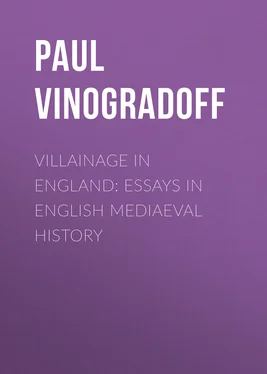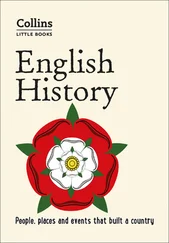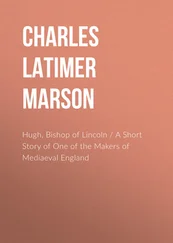Paul Vinogradoff - Villainage in England - Essays in English Mediaeval History
Здесь есть возможность читать онлайн «Paul Vinogradoff - Villainage in England - Essays in English Mediaeval History» — ознакомительный отрывок электронной книги совершенно бесплатно, а после прочтения отрывка купить полную версию. В некоторых случаях можно слушать аудио, скачать через торрент в формате fb2 и присутствует краткое содержание. Жанр: foreign_prose, Юриспруденция, История, foreign_edu, foreign_antique, на английском языке. Описание произведения, (предисловие) а так же отзывы посетителей доступны на портале библиотеки ЛибКат.
- Название:Villainage in England: Essays in English Mediaeval History
- Автор:
- Жанр:
- Год:неизвестен
- ISBN:нет данных
- Рейтинг книги:4 / 5. Голосов: 1
-
Избранное:Добавить в избранное
- Отзывы:
-
Ваша оценка:
- 80
- 1
- 2
- 3
- 4
- 5
Villainage in England: Essays in English Mediaeval History: краткое содержание, описание и аннотация
Предлагаем к чтению аннотацию, описание, краткое содержание или предисловие (зависит от того, что написал сам автор книги «Villainage in England: Essays in English Mediaeval History»). Если вы не нашли необходимую информацию о книге — напишите в комментариях, мы постараемся отыскать её.
Villainage in England: Essays in English Mediaeval History — читать онлайн ознакомительный отрывок
Ниже представлен текст книги, разбитый по страницам. Система сохранения места последней прочитанной страницы, позволяет с удобством читать онлайн бесплатно книгу «Villainage in England: Essays in English Mediaeval History», без необходимости каждый раз заново искать на чём Вы остановились. Поставьте закладку, и сможете в любой момент перейти на страницу, на которой закончили чтение.
Интервал:
Закладка:
240
Stoneleigh Reg., 4 a: 'Que quidem maneria existencia in possessione et manu domini regis Edwardi per universum regnum vocantur antiquum dominicum corone regis Anglie prout in libro de Domesday continetur.'
241
'Loquebantur de tempore S tiEdwardi Regis coram W. de Wilton.'
242
The men of King's Ripton.
243
I do not think there is any ground for the suggestion thrown out by M. Kovalevsky in the Law Quarterly, iv. p. 271, namely, that the law of ancient demesne was imported from Normandy. Whatever the position of the villains was in the Duchy, Norman influence in England made for subjection, because it was the influence of conquest. It must be remembered that in a sense the feudal law of England was the hardest of all in Western Europe, and this on account of the invasion.
244
Stubbs, Const. Hist. i. 454: 'In those estates, which, when they had been held by the crown since the reign of Edward the Confessor, bore the title of manors in ancient demesne, very much of the ancient popular process had been preserved without any change, and to the present day some customs are maintained in them which recall the most primitive institutions.' I shall have to speak about the mode of holding the courts in another chapter.
245
Brunner, Entstehung der Schwurgerichte, has made an epoch in the discussion of this phenomenon.
246
I shall treat at length of the Norman Conquest in my third essay.
247
Leg. Will. Conq. i. 29 (Schmid, p. 340).
248
Thorold Rogers has made great use of this last class of manorial documents in his well-known books.
249
Bracton, 271 b.
250
Bracton, 124.
251
Cartulary of Malmesbury (Rolls Series), ii. 186: 'Videlicet quod prefatus Ricardus concessit praedictis abbati et conventui et eorum tenentibus, tam rusticis, quam liberis—quod ipsi terras suas libere pro voluntate sua excolant.'
252
As to the Warwickshire Hundred Roll in the Record Office, see my letter in the Athenæum, 1883, December 22.
253
Rot. Hundred. ii. 471, a: ' Libere tenentes prioris de Swaveseia.... Henricus Palmer—1 mesuagium et 3 rodas terre reddens 12 d. et 2 precarias. Servi Adam scot tenet 10 acras reddens 4 s. et 6 precarias.... Cotarii ....'
254
Rot. Hundred. ii. 715, a: 'In servitute tenentes. Assunt et ibidem 10 tenentes qui tenent 10 virgatas terre in villenagio et operantur ad voluntatem domini et reddunt per annum 25 s.'
255
Rot. Hundred. ii. 690, 691: 'Villani—servi—custumarii. Et tenent ut villani, ut servi, ut libere tenentes.' Rot. Hundred. ii. 544, b: 'De custumariis Johannes Samar tenet 1 mesuagium et 1 croft … per servicium 3 sol. 2 d. et secabit 2 acras et dim., falcabit per 1 diem. De servis. Nicholaus Dilkes tenet 15 acras—et faciet per annum 144 opera et metet 2 acras. De aliis servis … De cotariis … De aliis cotariis.'
256
Rot. Hundred. ii. 528, a: 'Henr. de Walpol habet latinos ( corr. nativos ), qui tenent 180 acras terre et redd. 10 libr. et 8 sol. et 4 d. et ob. Nomina eorum qui tenent de Henrico de Walpol in villenagio .' Chapter House, County Boxes, Salop. 14, c: 'Libere tenentes … Coterelli … Nativi.'
257
Hale, in his Introduction to the Domesday of St. Paul's, xxiv, speaks of the 'nativi a principio' of Navestock, and distinguishes them from the villains. 'The ordinary praedial services due from the tenentes or villani were not required to be performed in person, and whether in the manor or out of it the villanus was not in legal language "sub potestate domini." Not so the nativus.' Hale's explanation is not correct, but the twofold division is noticed by him.
258
Domesday of St. Paul's, 157 (Articuli visitationis): 'An villani sive custumarii vendant terras. Item, an nativi custumarii maritaverunt filias—vel vendiderint vitulum—vel arbores—succidant.' A Suffolk case is even more clear. Registrum cellararii of Bury St. Edmunds, Cambridge University Gg. iv. 4, f. 30, b: 'Gersumarius vel custumarius qui nativus est.... Antecessor recognovit se nativum domini abbatis in curia domini regis.'
259
Cartulary of Eynsham in Oxfordshire, MS. of the Chapter of Christ Church in Oxford, N. 27, p. 25, a: 'In primis Willelmus le Brewester nativus domini tenet de dictis prato et terris…'
260
Eynsham Cartulary, 49. b: 'Johannes Kolyns nativus domini tenet 1 virgatam terre cum pertinenciis in bondagio.'
261
Cartulary of St. Mary of Worcester (Camden Series), 15. a: 'Nativi, cum ad aetatem pervenerint nisi immediate serviant patri—faciant 4 benripas et forinsici similiter.' Survey of Okeburn, Q.R. Anc. Miscell. Alien Priories, 2/2: 'Aliquis nativus non potest recedere sine licencia neque catalla amovere nec extraneus libertatem dominorum ad commorandum ingrediat sine licentia.'
262
Domesday of St. Paul's, 80: 'Nativi a principio. Isti tenent terras operarias.'
263
Queen's Remembrancer's Miscellanies, 902-62: 'Rotuli de libertate de Tynemouth, de liberis hominibus, non de nativis.'
264
Queen's Remembrancer's Miscellanies, 902-77: 'Nativi de Sebrighteworth (Proavus extraneus).' See App. X. Конец ознакомительного фрагмента. Текст предоставлен ООО «ЛитРес». Прочитайте эту книгу целиком, купив полную легальную версию на ЛитРес. Безопасно оплатить книгу можно банковской картой Visa, MasterCard, Maestro, со счета мобильного телефона, с платежного терминала, в салоне МТС или Связной, через PayPal, WebMoney, Яндекс.Деньги, QIWI Кошелек, бонусными картами или другим удобным Вам способом.
265
Warwickshire Hundr. Roll, Queen's Remembrancer's Miscellaneous Books, 29, 19, b: 'Johannes le Clerc tenet 1 virg. terre pro eodem sed est libere condicionis.' Augment. Off., Duchy of Lancaster, Court Rolls, Bundle 32, 283: 'Unum mesuagium et 19 acre terre in Holand que sunt in manu domini per mortem W. qui eas tenuit in bondagio. Ipse fuit liber, quia natus fuit extra libertatem domini.'
266
Glastonbury Inquisitions of 1189 (Roxburghe Series), 48: 'Radulfus niet tenet dimidiam virgatam.'
267
Glastonbury Inquis. (Roxburghe Series), 26: 'Rogerus P. tenet virg. terre: pro una medietate dat. xxx d. et pro alia medietate operatur sicut neth et seminat dimidiam acram pro churset et dat hueortselver.' Ibid. 22: 'Osbertus tenet 1 virgatam terre medietatem pro ii sol. et dono et pro alia medietate operatur quecumque jussus fuerit sicut neth.' Cartulary of Abingdon (Rolls Series), ii. 304: 'Illi sunt neti de villa. Aldredus de Brueria 5 sol. pro dimidia hida et arat et varectat et seminat acram suo semine et trahit foenum et bladum.' Ibid. ii. 302: 'Bernerius et filius suus tenent unam cotsetland unde reddunt cellario monachorum 6 sestaria mellis et camerae 31 d.'—' De netis. Robertus tenet dimidiam hidam unde reddit 5 sol. et 3 den. et arabit acram et seminabit semine suo et trahet foenum et bladum. Hoc de netis.'
Читать дальшеИнтервал:
Закладка:
Похожие книги на «Villainage in England: Essays in English Mediaeval History»
Представляем Вашему вниманию похожие книги на «Villainage in England: Essays in English Mediaeval History» списком для выбора. Мы отобрали схожую по названию и смыслу литературу в надежде предоставить читателям больше вариантов отыскать новые, интересные, ещё непрочитанные произведения.
Обсуждение, отзывы о книге «Villainage in England: Essays in English Mediaeval History» и просто собственные мнения читателей. Оставьте ваши комментарии, напишите, что Вы думаете о произведении, его смысле или главных героях. Укажите что конкретно понравилось, а что нет, и почему Вы так считаете.












